 Nicaragua : Safety by City
Nicaragua : Safety by City
Nicaragua is a country located in Central America.
Apart from the natural beauties it boasts which make this country a paradise for nature lovers, it has coastlines on both the Caribbean Sea, in the east, and the North Pacific Ocean, in the west for anyone looking to just relax by the crystal blue waters.
Nicaragua has the title of the largest country in Central America and the largest freshwater body in Central America, Lago de Nicaragua is located here.
And with nearly one-quarter of the nation’s population living in the Nicaraguan capital Managua, it is the second metropolitan area in Central America.
Out of many reasons the tourists come and visit this country, the biggest one is love for nature, and this country offers an abundance of it.
There are the impressive colonial cities of Granada and Leon, the island of Ometepe and the Mombacho volcano for hiking and trekking, the coffee farm region of Jinotega and Matagalpa in the mountainous regions, while the gorgeous surf beaches of the Pacific Coast go without saying.
The Rio San Juan area, which is the largest rainforest north of the Amazon, is rapidly becoming a largely popular eco-tourist destination, and its biodiversity is attracting nature lovers all around the world at the speed of light.
Warnings & Dangers in Nicaragua

OVERALL RISK: MEDIUM
Nicaragua is relatively safe to visit, but you should keep in mind that petty theft, as well as violent crimes, are extremely common here, so all precaution measures should be taken.

TRANSPORT & TAXIS RISK: MEDIUM
Taking public transport at night is highly advised against, due to the presence of criminals, both on public transport and on the roadways. Calling a taxi, or sharing a taxi with another person is far safer and common.

PICKPOCKETS RISK: HIGH
There is an extreme threat to petty crime. Pickpockets operate mainly in the major cities of Nicaragua. You should be extremely careful, especially in markets. Take as little as possible with you and never carry your money in a purse or a back pocket.

NATURAL DISASTERS RISK: MEDIUM
As far as natural disasters go, there are a couple of them hitting Nicaragua, such as earthquakes that can happen at any time. Then there is the hurricane season that lasts from June to November and the rainy season that often leads to floods. There are some active volcanoes in Nicaragua, the most dangerous one being San Cristobal which has been active since December 2012.

MUGGING RISK: HIGH
There have been reports of unauthorized taxis kidnapping people for ransom. Muggings, robberies, and rapes are also common. Be extremely careful.

TERRORISM RISK: LOW
Even though there haven't been any terrorist attacks in Nicaragua's recent history, they shouldn't be ruled out. Be aware of your surroundings at all times.

SCAMS RISK: HIGH
Like in every country taxi drivers might try to overcharge you. Apart from that, double check your change and negotiate everything in advance. Tourists are strongly encouraged not to use public ATMs, or if they do, not to flash their credit cards publicly. There have been many reports of credit card fraud in Nicaragua, as well as reports of extortion calls occurring.

WOMEN TRAVELERS RISK: MEDIUM
Women traveling solo are advised to be careful around men, even in front of employees at hotels, shops, and men providing any kind of tourist services. Many women have been sexually assaulted at the beaches of Nicaragua, so they are strongly advised not to walk alone both during day and night. Women should be prepared for rude comments by men when walking alone on the streets of Nicaragua.
So... How Safe Is Nicaragua Really?
Though Nicaragua’s lowered crime rate is talked about in the recent years, in reality, it still has some very dangerous neighborhood, especially in the north where, in 2008, gang violence began occurring, originating from Honduras and El Salvador.
However, the Nicaraguan police have been doing their job extremely well, regularly repressing organized crime and catching gang members.
Tourists are strongly advised against traveling alone at night.
It is always better to pay for a taxi instead of walking around scarcely lit or abandoned areas.
Managua is especially dangerous after dark, so remain vigilant.
Attacks and murders with a goal of robbing you happen here even during broad daylight and in front of witnesses, particularly in Rivas and Managua.
The best advice for tourists would be to travel accompanied by someone who knows the area as well as the language.
There are many local organizations that offer translator or guide services.
Women are advised to be especially cautious.
Verbal sexual harassment of women, both foreign and local, is constant, and if you are traveling solo, you can expect cat-calling to be common even for Latin American standards.
Men and boys of all ages tend to make kissing noises, whistle and shout rude comments with a sexual connotation.
How Does Nicaragua Compare?
| Country | Safety Index |
|---|---|
| Nicaragua | 46 |
| Morocco | 54 |
| Austria | 92 |
| Croatia | 83 |
| Italy | 77 |
| Malaysia | 69 |
| Finland | 86 |
| Spain | 83 |
| Botswana | 77 |
Useful Information

Visas
Most nationals do not need a visa for any stays in Nicaragua shorter than 90 days. Make sure your passport is valid for at least six months past your return date. If you are not sure about your visa status, visit www.doyouneedvisa.com which will let you know whether or not you need a visa based on your nationality and the country you want to visit.

Currency
Nicaraguan Cordoba is the official currency in Nicaragua, while US dollars are the alternative currency. ATMs are widespread throughout major cities but if you're going to rural regions, make sure you bring some cash. Credit cards are mostly accepted.

Weather
The climate in Nicaragua can be described as tropical. Just like in most Central American countries, there is the dry season and the wet season. The dry season lasts from January to June, while the wet season lasts from May to October, during which period the weather is a bit cooler.

Airports
Augusto C. Sandino International Airport is the main joint civil-military public international airport in Managua, the capital of Nicaragua. It is located in the City's 6th ward, locally referred to as Distrito 6.

Travel Insurance
Just like anywhere else, we recommend getting travel insurance when traveling to Nicaragua, since it covers not only the costs medical problems but also theft and loss of valuables.
Nicaragua Weather Averages (Temperatures)
Average High/Low Temperature
| Temperature / Month | Jan | Feb | Mar | Apr | May | Jun | Jul | Aug | Sep | Oct | Nov | Dec |
|---|---|---|---|---|---|---|---|---|---|---|---|---|
| High °C | 32 | 32 | 34 | 34 | 34 | 32 | 31 | 32 | 31 | 31 | 31 | 31 |
| Low °C | 20 | 21 | 22 | 23 | 24 | 23 | 23 | 23 | 23 | 22 | 21 | 21 |
| High °F | 90 | 90 | 93 | 93 | 93 | 90 | 88 | 90 | 88 | 88 | 88 | 88 |
| Low °F | 68 | 70 | 72 | 73 | 75 | 73 | 73 | 73 | 73 | 72 | 70 | 70 |
Nicaragua - Safety by City
| City | Safety Index |
|---|---|
| Managua | 71 |
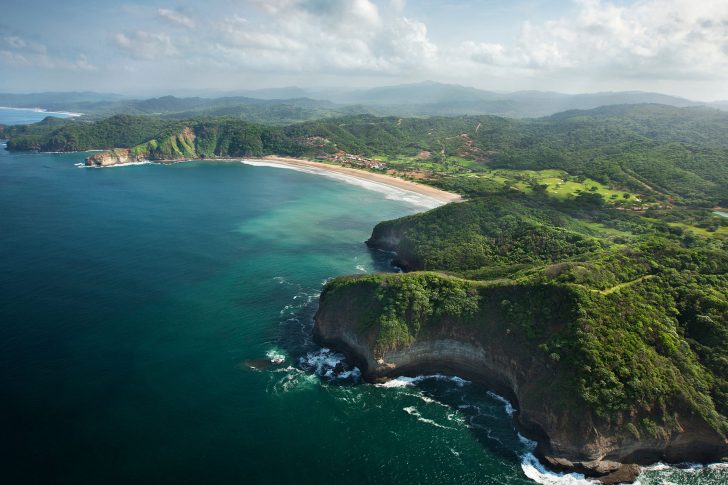
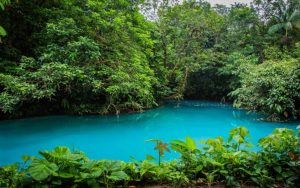
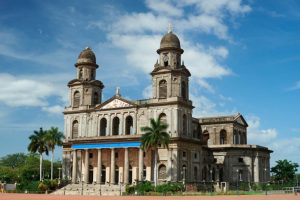
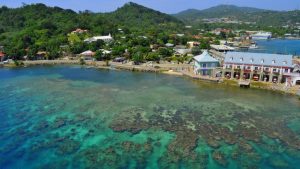
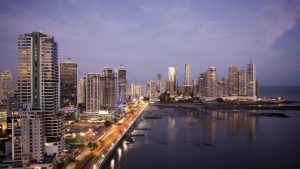
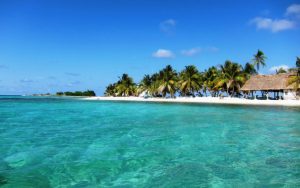
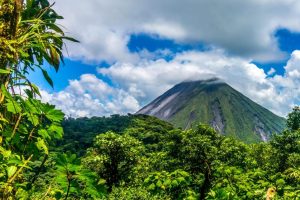





While not afraid for my person, theft is high.
Having personally been robbed while sleeping in a cabaña on Little Corn Island, I can concur with your assessment of the theft risk as high. Follow-up by the police was nonexistent, despite the fact that I filled out all the paperwork, the island is small, the thefts are recurring, locals believe they know who the thieves are, and the stolen camera was relatively unique.
Nicaragua it is a dangerous place , the police they kill people very easy . They took bribe every time on the street . Robery are around the corner s as nd police do nothing armed people are everywhere to still money or properties , conclusión , Nicaragua is not safe at all
A place everyone should visit
Nicaragua is a place everyone should visit at least once in their lifetime. It’s so filled with beautiful places and good people. Of course there are dangers but if you do your research and take care, everything will be fine.
Beautiful but unsafe
Unfortunately, someone will try to steal something from you while you’re there. It’s just that kind of place. And it’s a real shame because the place is absolutely beautiful. Not a place to go to alone, with friends it can be a great experience.
Safe for us. We love the people!
We love Nicaragua and the people! We’ve been to Nicaragua six times for a month each time.
Granada has been our main city to stay when in the country but we visit other places too such as San Juan del Sur, Jinortega, Leon, Estili and other places too. Granada is a beautiful colonial city with so much character.
Many businesses and restaurants speak English. The people seem very spiritual and involved in their churches (mostly Catholic) and seem happy and loving.
People are poor and do beg but more commonly try to sell things. We’ve had no problems with crime when we are out and about during the day and early evening.
We don’t go out in unpopulated areas or dark streets at night but we don’t do that in our own country (the United States) either.
I absolutely love this country!
Not safe
A friend of mine was robbed and murdered in Nicaragua so safe? Ehh not so sure
4 stars robbed and murdered ?
Then your friend went looking for it.
If that’s the case, why would you rate the safety 4 stars?
A
I wonder what it would take to get a 3 star rating from you. I would hate to find out
Bullshit..live here and have my residency. As for the people who “say” they have had problems. Then you have looked for them. beautiful people and a beautiful country. Live here and see.
Questions
Do you still live there? Is there a way to arrange transport and should we exchange money before we go and how much should I travel with ?
Calm and hospitable
The country’s residents are friendly and welcoming. Isla Ometepe in particular is a space where violent crime is practically unheard of. It’s policed as a community and people do not tolerate those who look to harm others. Petty theft is rising as unemployment and poverty does. The country is seeing it’s second economic crisis in 2 years. I feel safer here than in European cities.
Very nice living here
Im koos dutch and living on isla de ometepe my experience are nice people very safe and very beautifal im also living in costarica but here much tranquil
Nicaragua is amazing
I’ll be moving there soon! Paying for a piece of land currently 🙂 Ometepe is where my heart is. It is paradise.
Safer than most USA cities!
I’ve lived in Managua, Jinotepe and Rivas administrative districts for over 15 years. I am dumbfounded by the fear-inciting comments about danger and crime. What are these people talking about? In all the years I’ve had a minor car burglary. Never felt threatened or in danger, the contrary. People here are very ethical and supportive. They will run to help if they can whatever the problem … flat tire? lost? need translation? In a car accident? I drive unafraid over 300 KM every week, both during the day and night, in cities and rural areas. I’ve picked up hitch hiking Nica and gringo hitchhikers, both single women and men who travel unafraid. This is a very tranquil and proud country under a lot of pressure right now.
Safe is as Safe does! Be Safe!
I have lived in Nicaragua full time for 15 years and never had a safety issue.. yes I have heard of petty theft etc which I would consider low on a per capita relative to most of the World.
We felt safe in the South
Please put dates on the user comments so that we can judge when they were and how they affect us today.
We were there in 2014 and 2016, staying in the southern part of Nicaragua, and felt extremely safe.
EXCELLENT point. We lived there from 2013 through 2014 and loved it and have since been back three times.
Safe and free
My wife and I have been traveling here for 12 years and now have been living here permanently for the last year. We absolutely love the country and the people. For safety, I would rate the country as a whole more safe than a major US city but probably less than small town USA. It is a beautiful country and we feel safe and free here.
Safe and Free??????
Thank you for the comment! My husband and I along with our three teenage boys are traveling to Nicaragua in eight days. We’re very excited to see your beautiful Country you now call home! Some of our friends bought houses in Nicaragua and absolutely love it!
My wife and I spent 6 weeks in early 2020 in an apartment 5 minutes from the beach in San Juan del Sur. Overlooking the ocean with amazing daily sunsets, it was magical. Lovely people and is generally a younger demographic. Their economy is challenged by an uncertain
political situation. Never felt in danger anywhere in the Rivas (province) area and cannot speak for other parts of the country. Like anywhere else there is no need to go out looking for trouble by treating people like they work for you. Be nice and friendly and a smile from you will go a long way. People are generally helpful and despite speaking a very limited amount of Spanish most were keen to be helpful and even patient. It’s a rustic environment with lots of time spent outside from November to April. Lots of beeches within the area and small trucks drive back and forth to various beeches for about $5 each way per person.
Not great for people who have only been to resorts and prefer to be served on.
That’s also available and sold as an adventure tour ($$$$ daily) and which might be perfect for some. If you’re looking for luxury it is available but planning ahead is crucial and with a good outfit. a great spot to spend some time with lovely friendly people.
This beautiful country is meant to be explored
I don’t know exactly what the situation is in all of the cities in Nicaragua. I know people that have visited this country and think it’s heaven on earth. They didn’t have any bad experiences, none at all. And I think everyone that has been here can recognize the absolute beauty of this place. It’s pretty surreal. Are there dangerous places in the country? Yes there are. There are thefts occurring almost daily even in the daytime. Like always, it’s best to keep a close eye on your belongings, all of them whether it’s your phone or wallet or handbag and so on.
I recommend visiting the Islets of Granada (there are 365 of them). Some of them are deserted but there are some that have small development on them, specifically ecolodges. It’s interesting to see if you’re into this. The Masaya Volcano is a nice place to visit from some breathtaking views. You can get pretty close to this active volcano and you will see the lava up close and personal.
Have you ever done volcano surfing? Yes, it’s actually a thing, believe it or not. I loved it! Going to Cerro Negro will give you the chance to do just that: ride on a wooden surboard on the side of a volcano. You will have a boiler suit and goggles for protection. You will easily reach speeds of 60 miles per hour so this is not for everyone. Please know that it will take around 30-40 minutes to get on top of the volcano and only then you can go down.
If you want to see nature in (almost) it’s rawest form then head to Mombacho Volcano Nature Preserve. 2500 acres of forest, farms, coffee plantations, flora (more than 800 plants), birds, monkeys. You’ll use the hiking trails to experience all of this so be ready with water, snacks and plenty of energy.
There’s also the Bosawas Biosphere Reserve which is amazing! It’s huge, being the second in the world (size wise) after the huge Amazon rainforest from Brazil.
Ometepe is heaven on earth. Absolutely gorgeous. The people and the atmosphere. Im american and glad i discovered this paradise!
Way dangerous
Regardless of the 4 and 5 stars given just remember some of us lived in Nicaragua. After my 3rd year living in Nicaragua in a supposed good neighborhood I was robbed at gunpoint twice and my apartment vandalized. Always remember MS-13 is alive and well throughout Nicaragua. I lived in Matagalpa the coffee region 3 years. Little did I realize anywhere in Northern Nicaragua is where ms-13 enters through Honduras. Then they work their way to Leon, Grenada then Managua.All united states airlines have permanently stopped service to Nicaragua as of 2018 Aeromexico and Copa airlines has too.The only flights into Managua are from Avianca airlines. Layover time is normally 3 to 5 hours in El Salvador and the flights arrive normally between 9:30 pm to 10:30 pm. There’s been abductions inside of the airport in San Salvador security looks the other way. Nowhere in Central America is safe just how it is. Nowhere is safe anywhere in South America either. So I’m not singelinig,out just Nicaragua. But I’ve stayed throughout Central and South America over the years. Best advice don’t put yourself in danger. Sure Central and South America are beautiful but underneath it all lurking in the shadows it’s all extremely dangerous.